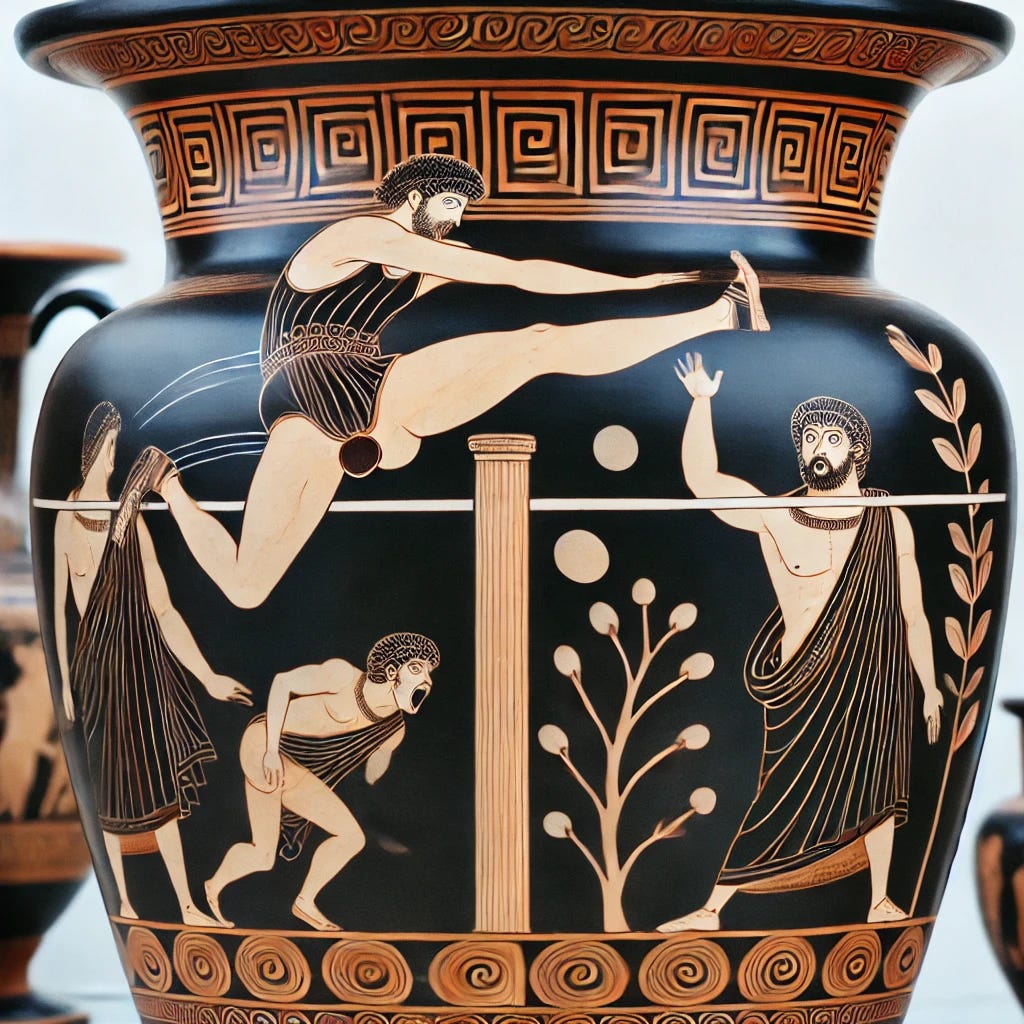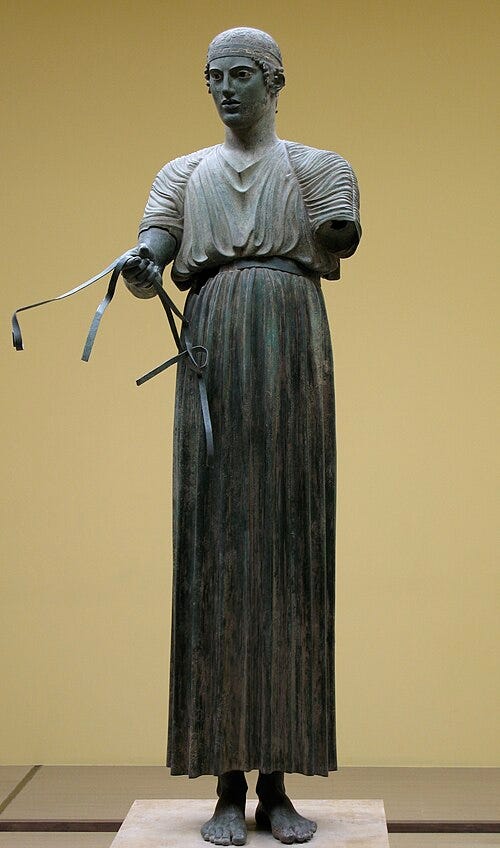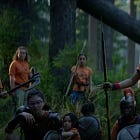The Paris Summer Olympics are in full swing, and they’ve reminded me of my favorite part of the Olympics: seeing what will become a meme. From the bespectacled pommel horse specialist to the memes comparing different approaches to shooting style and gear to the pole vaulter who seemingly knocked over the pole with his junk, the Olympics is always a treasure trove of hilariously random subplots, and I love that about it.

When you think about it for even a moment, the Olympics is a very weird tradition. Let’s all wear sparkly outfits and perform extremely specific feats of athleticism! And don’t even get me started on the pageantry of the opening ceremonies. My take is that the Olympics is weird as hell, and it’s at its best when it leans into that weirdness.
As a classicist, I am obligated to point out that the Olympics have a classical precedent in the Olympian games, founded in 776 BCE. Whatever. I don’t find this stuff super interesting, but I get asked about it a lot every two years, so here’s the quick rundown: the ancient Olympian games happened at Olympia (shocker) every four years. They were part of a religious festival to honor Zeus, and were the most important of the four Panhellenic games. (The other three were the Pythian games at Delphi, honoring Apollo; the Isthmian games near Corinth, honoring Poseidon; and the Nemean games, honoring Zeus, but, like, less prestigiously than the Olympian games.)
Like today’s Olympics, the Panhellenic games weren’t just about athletic contests. They were about nationalism (although city-states weren’t nations in the modern sense). They were a way to get together and have different cities compete to show who was strongest, but without having to butcher each other, a nice side perk.
has written a number of excellent articles about this topic, most recently on his substack, about how the funeral games for Patroclus in Iliad 23 are part of that tradition of sublimating violence into athletics:Also, unlike in war, a lot of the cost gets deferred not to the city itself but to the individual athletes. Even more than today, competing in the ancient games seems to have been possible only for the elite. So the games also served the purpose of cementing bonds between an inter-city-state aristocracy. The ties between the aristocracy were often stronger than the ties between the aristocrats and the polis they lived in.
Winning a contest at one of the four major Panhellenic festival games was a pretty big deal in terms of bragging rights. In Athens you could eat for free for life at the public mess hall if you won, although since the winners tended to be rich, I suspect the bragging rights were the bigger draw. Since they were rich they could also afford to commission art to celebrate their victory, including sculptures like the famous Charioteer of Delphi:
This bronze statue was only part of a bigger installation that also included a bunch of bronze horses, and it commemorated the victory in the chariot race (obviously) of Polyzalus, tyrant of Gela in Sicily. In the context of ancient Greek history and literature, “tyrant” is a technical term for a non-hereditary monarch and isn’t meant as a commentary on the level of autocratic behavior performed by that monarch. (Which does not mean that I’m vouching for any tyrants that they were actually good dudes.) Polyzalus’ brother Hieron, tyrant of Syracuse, was one of the most significant patrons of the arts in the 5th century BCE, and it was in honor of one of his victories that my favorite bonkers Olympic poem was ever written.
You see, in addition to commissioning sculptures, victors also commissioned poems. These poems are sometimes called “epinician” (from nike, like the shoe, meaning “victory”). It’s hard to tell exactly how big the epinician ode industry was, but it seems to have been a pretty niche genre of lyric poetry. The epinician odes that survive today are by two poets, Pindar (the good one) and Bacchylides (the one who wrote the ode I’m about to dunk on, and who I kind of prefer).
Bacchylides is sort of an interesting figure. For one, he’s the nephew of Simonides, one of the greatest lyric poets and a giant in the genre. So he’s sort of the nepo baby of epinician poetry, a phrase that ten years ago I would have died laughing if you’d told me it would come out of my keyboard. His style is overall less grand and less philosophical than Pindar’s. The imagery and language is less dense and difficult. Liking Bacchylides more than Pindar is a little like saying that you prefer burgers to sushi, I guess. But you know what? Burgers rule.
I’ve mentioned Bacchylides 17 before in this newsletter, another absolutely nuts poem where Theseus jumps into the ocean and is given a demigod glow-up by his stepmother Amphitrite:
It’s wild. It’s not an epinician ode, though — it’s a dithyramb, a kind of hymn, not a poem written to celebrate an athletic contest. My favorite Bacchylidean epinician is Bacchylides 5, a poem written to celebrate a horse-race victory by Hieron at the Olympian games in 476. It is an absolute bonkers piece of poetry, and I think it really does justice to the spirit of Olympic weirdness that continues on today.
The poem tells a story about Heracles. A nice choice. Heracles is associated with Olympia, and with Zeus, so celebrating him in this context makes a lot of sense, and implicitly linking him with Hieron is of course super flattering. And the incident chosen is one of Heracles’ greatest hits: going down into the underworld to fetch Cerberus, his final labor. So far, so good.
Down in the underworld Heracles meets the shade Meleager, a dead hero. He’s so impressed by Meleager’s shreddedness that he draws his bow, because he’s a dingdong and has forgotten that there are no other living people down here. In myth and literature, Heracles is usually depicted as a complete meathead. He’s scary, violent, and also an absolute dumbass who really loves to eat. He shows up frequently in ancient comedic genres, because honestly, the jokes pretty much write themselves.
When Meleager reminds Heracles that he’s dead and therefore not a threat, Heracles wants to know who killed Meleager, because that guy seems worth avoiding. Fortunately for Heracles, Meleager wasn’t killed by a guy, but rather by his own mother.
It’s a really sad story, and also a really interesting and rich one. When Meleager was born, his mother Althaea was told that he’d live as long as the log in the fire burned. She immediately yanked it out and hid it away to keep it safe. But then, many years later, Meleager participated in the Calydonian Boar Hunt, an important episode from myth where a bunch of heroes got together to kill a giant pig and then kill each other while fighting over who would get to keep the trophies from the dead pig. In the resulting fight, Meleager killed both of his mother’s brothers, because, according to him, friendly fire just be like that (trans. Arnson Svarlien):
Then I killed, among many others, Iphiclus and noble Aphares, my mother's swift brothers; for strong-spirited Ares does not discern a friend in battle—shafts fly blindly from the hands against the souls of the enemy, and bring death to whomever the god wishes.
Strangely, his mother isn’t moved by this explanation, so she gets out her son’s life-log and lights it up, and he drops dead.
There’s a lot in this story. Althaea is part of a very small cadre of infanticidal mothers in myth with Medea and Ino, and her actions seem more emotional and less scheming than the others. She’s also an interesting figure in light of the much-debated lament in Sophocles’ Antigone where Antigone says that she’d sacrifice herself for a brother over a child, because she could always have more children, but since her parents are dead she can’t have more brothers. Audiences have, historically, hated this passage, because it makes no damn sense: how are you supposed to have more kids if you sacrifice yourself for your brother and die? Goethe hoped that someday a philologist would prove that the passage was spurious (which is to say, it was a later interpolation and not authentically Sophoclean). But I think Althaea’s actions and her prioritization of her blood-bond with her brothers over her son sort of rhyme with Antigone’s desperate rationalizing self-justification.
Heracles, of course, responds to Meleager’s tale with wisdom, empathy, and grace. JK. Actually, he says, “Wow, that’s a sad tale. But also, do you have a sister who looks like you? Because I’d hit that.” In case you think I’m joking:
“For mortals it is best never to be born, never to look on the light of the sun. But there is no profit in lamenting this; one must speak of what can be accomplished. Is there, in the halls of battle-loving Oineus, any daughter, unsubdued by love, whose appearance is like yours? I would gladly make her my splendid bride.”
And that’s the true story of how Heracles married Deianeira, the woman who would one day kill him.
It’s the weirdest possible takeaway. Which is fine as far as the genre is concerned — epinician odes don’t really have strict morals. They’re not really about how great athleticism is, per se. But seriously? This one is strange as hell, and I love that about it. In comparison, Pindar wrote his most famous epinician, Olympian 1, to honor the exact same victory, and it’s not nearly as bizarre and fun, although most people who care about such things would probably say it’s objectively better than Bacchylides 5. But poetry isn’t the Olympics, and there aren’t objective metrics to award the gold, so I get to decide which random weirdness appeals to me more.
Enjoy the hilarious Olympic subplots. That poor pole vaulter!!








Oh ouch'e, I hadn't heard about the 'pole' vaulter! Thanks! And your take down on that poem is hilarious or "bonkers" as you noted, lol. But it does seem 'any' event, Olympic or otherwise can inspire or be an excuse for verse, good or otherwise...